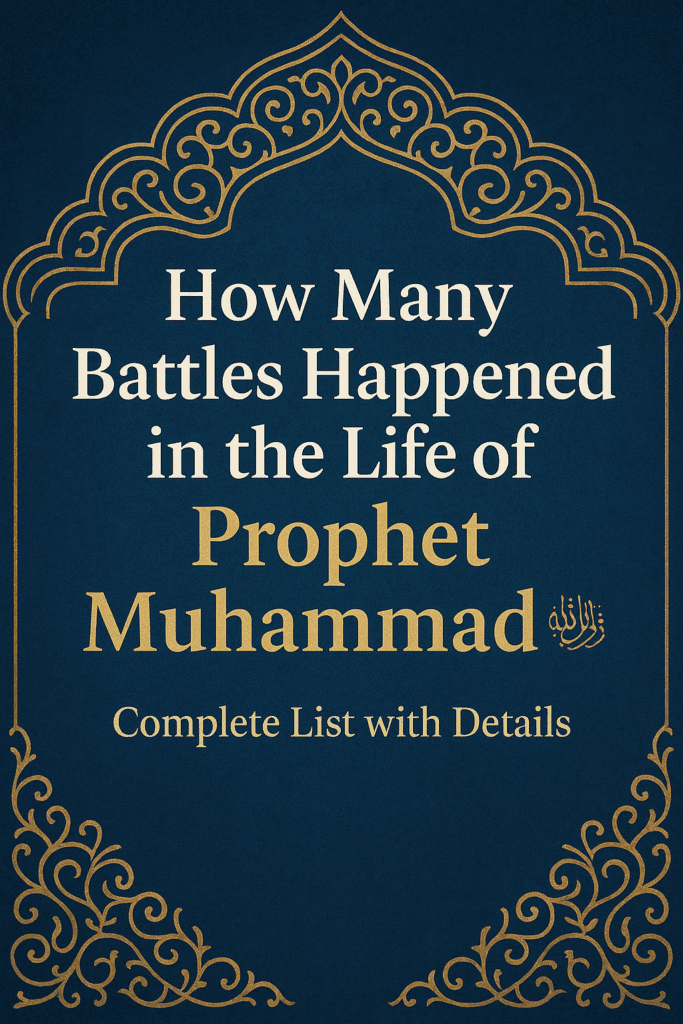All Battles of Prophet Muhammad ﷺ: From Badr to Tabuk with References

Introduction
Islamic history is rich with lessons of courage, patience, and faith. During the life of Prophet Muhammad ﷺ (peace be upon him), many battles and expeditions took place. These battles were not fought for power or conquest but primarily for self-defense, religious freedom, and justice. According to authentic Islamic sources like Ibn Hisham’s Seerah, Ibn Kathir’s Al-Bidayah wa’l-Nihayah, and Sahih Hadith collections, the Prophet ﷺ personally took part in 27 battles (Ghazawat), while he sent companions to lead around 47 expeditions (Saraya).
In total, historians record more than 70 battles and expeditions in his blessed lifetime.
Categories of Battles
- Ghazawat (غزوات): Battles in which Prophet Muhammad ﷺ personally participated.
- Saraya (سرايا): Expeditions led by his companions under his command.
Major Battles in the Life of Prophet Muhammad ﷺ
1. Battle of Badr (2 AH / 624 CE)
- Opponent: Quraysh of Makkah
- Details: First major battle between Muslims and Quraysh. Despite being outnumbered (313 Muslims vs. 1,000 Quraysh), Muslims achieved a decisive victory.
- Reference: Sahih al-Bukhari, Book of Maghazi.
2. Battle of Uhud (3 AH / 625 CE)
- Opponent: Quraysh led by Abu Sufyan
- Details: Quraysh sought revenge after Badr. Muslims initially dominated, but due to disobedience of archers, Quraysh counterattacked. Prophet ﷺ was injured.
- Reference: Ibn Kathir, Al-Bidayah wa’l-Nihayah vol. 4.
3. Battle of the Trench (Khandaq) (5 AH / 627 CE)
- Opponent: Quraysh, Jewish tribes, and Ghatafan confederation
- Details: Muslims defended Madinah by digging a trench (idea of Salman al-Farsi). The siege failed.
- Reference: Sahih al-Bukhari, Hadith 4109.
4. Battle of Khaybar (7 AH / 628 CE)
- Opponent: Jewish tribes of Khaybar
- Details: Stronghold of Khaybar was captured. Ali ibn Abi Talib (RA) played a heroic role.
- Reference: Sahih Muslim, Book of Jihad.
5. Conquest of Makkah (8 AH / 630 CE)
- Opponent: Quraysh (but peaceful entry)
- Details: Prophet ﷺ entered Makkah with 10,000 companions. The city was conquered peacefully with minimal bloodshed. Idols in the Kaaba were destroyed.
- Reference: Ibn Hisham, Seerah, vol. 4.
6. Battle of Hunayn (8 AH / 630 CE)
- Opponent: Hawazin and Thaqif tribes
- Details: Muslims were ambushed, initially retreated but regained victory.
- Reference: Qur’an [9:25–26].
7. Battle of Tabuk (9 AH / 631 CE)
- Opponent: Byzantine Empire (no actual fighting)
- Details: Largest Muslim army (30,000) marched to Tabuk. No battle took place as Byzantines retreated.
- Reference: Sahih al-Bukhari, Hadith 4418.
Other Ghazawat (Prophet ﷺ Present)
Besides the above, Prophet ﷺ also took part in battles such as:
- Waddan (Al-Abwa) – 2 AH
- Buwat – 2 AH
- Sawiq – 2 AH
- Banu Nadir – 4 AH
- Banu Qurayza – 5 AH
- Dhu Qarad – 6 AH
- Siege of Ta’if – 8 AH
In total, 27 Ghazawat are recorded.
Saraya (Expeditions Led by Companions)
Some important Saraya include:
- Sariyyah of Hamzah ibn Abdul Muttalib – 1 AH
- Sariyyah of Ubaydah ibn al-Harith – 1 AH
- Sariyyah of Sa’d ibn Abi Waqqas – 1 AH
- Expedition of Abdullah ibn Jahsh (Nakhla) – 2 AH
- Battle of Mu’tah (led by Zayd ibn Harithah, Ja’far ibn Abi Talib, and Khalid ibn Walid) – 8 AH against Byzantine forces
In total, there were around 47 Saraya.
Total Number of Battles
- 27 Ghazawat (Prophet ﷺ present)
- 47+ Saraya (led by companions)
➡️ 74+ battles/expeditions in total during the blessed life of Prophet Muhammad ﷺ.
Wisdom Behind These Battles
- Defense of Madinah against aggression
- Protection of religious freedom
- Breaking alliances of betrayal
- Establishing peace and justice
Allah ﷻ says:
“Permission [to fight] has been given to those who are being fought, because they were wronged. And indeed, Allah is competent to give them victory.”
(Qur’an 22:39)
Conclusion
The battles in the life of Prophet Muhammad ﷺ were not for worldly gain, but for establishing justice and protecting the message of Islam. His strategy, patience, and mercy even towards enemies remain a timeless example for humanity.